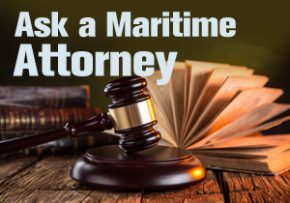Ask A Maritime Attorney: Liability and the Importance of Marine Insurance
Question:
My boat was blown loose from its dock during a recent storm and it drifted into two other boats in the marina. The cause of the mayhem was clear. My slip is an “end tie,” at the end of a gangway in the marina, and several of my dock cleats were loose and seriously in need of repair. I reported the problem to marina management months ago, but they never got around to repairing the cleats. Two of the cleats pulled out from the dock during the storm and my boat was set adrift. I submitted a claim to the marina for the repair of my boat and for my loss of use of the boat for the three weeks that it will be in the shipyard. To my surprise, the marina has refused to honor my claim, and to make matters worse, the owners of the other boats are demanding that I pay for their repairs and loss of use. Can you help me pursue the marina for the cost of repairs to all three boats?
Answer:
The short answer to our reader’s question is “no.” He will be probably be held liable for the repairs to his own boat as well as the other boats that were damaged when his boat came loose from its dock, and he should promptly submit a claim to his insurance company.
Boat owners are tasked with certain obligations that are inherent in boat ownership. Some of those obligations arise by contract, such as the obligation set forth in every marine insurance policy to maintain a boat in a seaworthy condition. Other obligations arise under general maritime law. Our reader, like all boat owners, is obligated under general maritime law to safely secure his boat at its dock or mooring.
The obligation to properly secure your boat is non-delegable, meaning that you cannot avoid the obligation by delegating it to someone else. If a boat is damaged, or if it causes damage, because of a failure of a dock or mooring equipment, the boat owner will almost always be held liable. The only real exception to this rule is where the defect to the dock or mooring equipment is hidden from view and could not be discovered through a reasonable inspection. Our reader is unable to rely on this exception. He was aware of the defective cleats and even reported them to marina management, yet he continued to use them to secure his boat.
Similarly, the owners of the other boats will be able to recover from our reader (or his insurance company). When a stationary object, such as a moored boat, is damaged by a drifting object, such as our reader’s boat, the drifting object is presumed to be at fault. Our reader’s only real defense would require him to prove that the other boats were moored in an inherently dangerous location or that the damage that they suffered was due to their own failure to properly secure their boats, but that does not seem to be the case here.
Based on the foregoing, it appears that our reader will be liable for the damage to all three boats, but he will avoid at least one of the claims that he described. He won’t be liable for the claims by the other boat owners for the loss of use of their boats. The U.S. Supreme Court has held that damages for loss of use of a recreational vessel are not recoverable. The legal basis for this holding is basically that our free time has no economic value, and the loss of use of a pleasure boat is similar to the loss of use of a tennis ball or baseball bat.
This case highlights the importance of a marine insurance policy for all boat owners since the incident as described by our reader will almost certainly be a covered insurance claim. It also explains why marinas invariably require their tenants to maintain liability coverage.
David Weil is licensed to practice law in the state of California and as such, some of the information provided in this column may not be applicable in a jurisdiction outside of California. Please note also that no two legal situations are alike, and it is impossible to provide accurate legal advice without knowing all the facts of a particular situation. Therefore, the information provided in this column should not be regarded as individual legal advice, and readers should not act upon this information without seeking the opinion of an attorney in their home state.
David Weil is the managing attorney at Weil & Associates (www.weilmaritime.com) in Seal Beach. He is certified as a Specialist in Admiralty and Maritime Law by the State Bar of California Board of Legal Specialization and a “Proctor in Admiralty” Member of the Maritime Law Association of the United States, an adjunct professor of Admiralty Law, and former legal counsel to the California Yacht Brokers Association. If you have a maritime law question for Weil, he can be contacted at 562-799-5508, through his website at www.weilmaritime.com, or via email at dweil@weilmaritime.com.



While I more than respect the opinions and guidance provided by Mr. Weil, I must wonder if the one above, although entirely accurate as I understand the facts, is possibly incomplete. Obviously, depending to some extent on his contract with the marina, does not the reader (or his insurance carrier) still have a cause or causes of action against the marina, perhaps in indemnity, and maybe in state court?